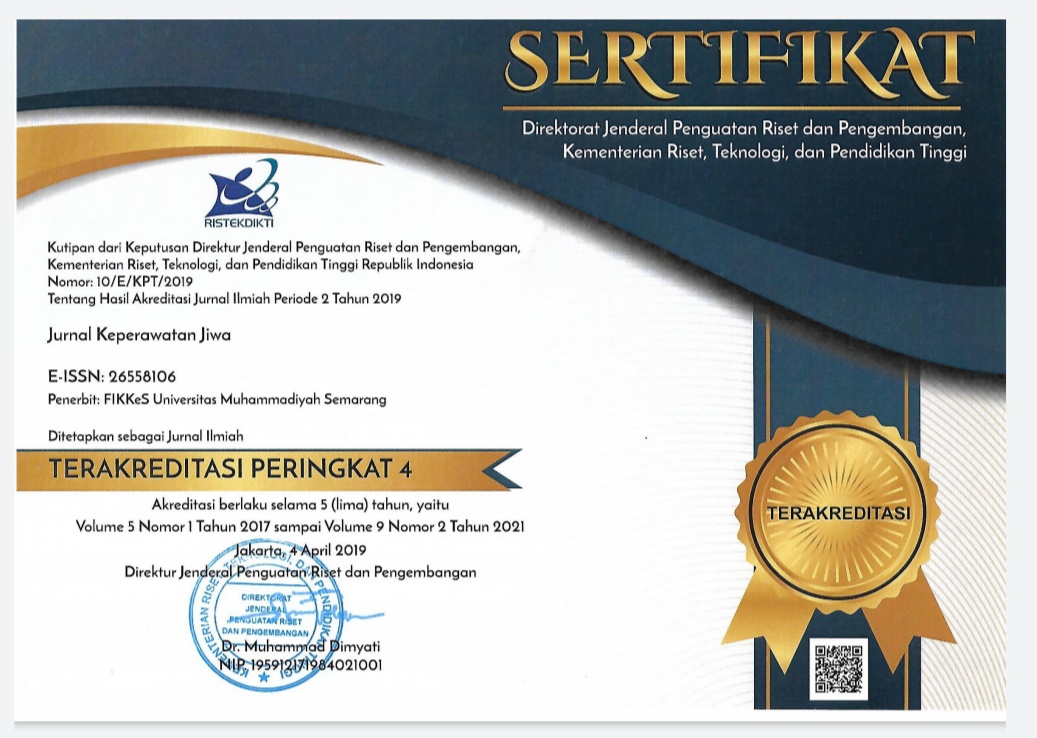Adat Ipilah: A Traumatic Life Experience
(1) STIKES Suaka Insan Banjarmasin
(2) STIKES Suaka Insan Banjarmasin
(*) Corresponding Author
Abstract
Adat Ipilah is a mandatory customary sanction given to women who are pregnant out of wedlock by the Dayak Ma'anyan tribe in Central Kalimantan, Indonesia as a form of sanction for social violations. Carried out on pregnant women in the first trimester, generally in the first pregnancy. Pregnant women will demonstrate in front of traditional and community elders. The implementation of Ipilah can be a stressor and affect the psychological health of pregnant women. The research was to explore the impact of the implementation of the Ipilah custom on the psychology of Dayak Ma'anyan women. Using qualitative methods with an interpretive phenomenology approach. Participants were selected using a purposive sampling technique. Data collection by in-depth interviews. Analyzed using interpretative phenomenological analysis. Get 6 themes; Disappointed with adat, forced to follow Ipilah, afraid of the sanctions that will be received, ashamed to interact with the community, pressured because cannot forget Ipilah, helpless with the situation. Ipilah sanction was a traumatic experience that had a negative psychological impact. Ipilah is a source of stressors that affect the lives of women who experience it. Whether it's psychological or social relations in society.
Keywords
Full Text:
PDFReferences
Alvarenga, P., & Frizzo, G. B. (2017). Stressful Life Events and Women ’ s Mental Health During Pregnancy Period, 27(66), 1–9. https://doi.org/10.1590/1982-43272766201707
Arpawong, T. E., Rohrbach, L. A., Milam, J. E., Unger, J. B., Sun, P., Spruijt-metz, D., & Sussman, S. (2014). Stressful life events and predictors of post-traumatic growth among high-risk early emerging adults. The Journal of Positive Psychology, (September 2015). https://doi.org/10.1080/17439760.2014.994223
Aziz, A., Thabet, M., & Vostanis, P. (2017). Relationships Between Traumatic Events , Religious Coping Style , and Post- Traumatic Stress Disorder among Palestinians in the Gaza Strip Keywords : Participants, 1–9.
Bisson, J. I., Cosgrove, S., & Lewis, C. (2015). Post-traumatic stress disorder. https://doi.org/10.1136/bmj.h6161
Boyle, M. P., & Fearon, A. N. (2017). Self-stigma and its associations with stress , physical health , and health care satisfaction in adults who stutter. Journal of Fluency Disorders, (May), 0–1. https://doi.org/10.1016/j.jfludis.2017.10.002
Didymus, F. F. (2017). Olympic and international level sports coaches ’ experiences of stressors , appraisals , and coping stressors , appraisals , and coping. Qualitative Research in Sport, Exercise and Health, 9(2), 214–232. https://doi.org/10.1080/2159676X.2016.1261364
Hutahaean, S. (2013). Perawatan Antenatal. Jakarta: Salemba Medika.
Kemppainen, J. K., Mackain, S., Alexander, M., Reid, P., & Jackson, M. P. (2016). Post traumatic Stress Disorder and Stressful Life Events Among Rural Women With HIV Disease. Journal of the Association of Nurses in AIDS Care, 1–10. https://doi.org/10.1016/j.jana.2016.06.001
Paul, S. (2016). Responses to stigma-related stressors : a qualitative inquiry into the lives of people living with schizophrenia in India the lives of people living with schizophrenia in India. International Journal of Culture and Mental Health, (June). https://doi.org/10.1080/17542863.2016.1185134
Reeder, S. J., Martin, L. L., & Griffin, D. K. (2013). Keperawatan Martenitas (18th ed.). Jakarta: EGC.
Roten. (2018). Interview tentang Ipilah. (Komunikasi Personal, 23 Maret)
Sadeh, N., Miller, M. W., Wolf, E. J., & Harkness, K. L. (2015). Negative emotionality and disconstraint influence PTSD symptom course via exposure to new major adverse life events. Elsevier Ltd, 31, 20–27. https://doi.org/10.1016/j.janxdis.2015.01.003
Schock, K., Böttche, M., Rosner, R., Wenk-ansohn, M., Schock, K., Böttche, M., … Wenk-ansohn, M. (2016). Impact of new traumatic or stressful life events on pre-existing PTSD in traumatized refugees : results of a longitudinal study Impact of new traumatic or stressful life events on pre-existing PTSD in traumatized refugees : results of a longitudinal study, 8198(May 2017). https://doi.org/10.3402/ejpt.v7.32106
Schönfeld, P., Brailovskaia, J., Bieda, A., Zhang, X. C., & Margraf, J. (2016). The effects of daily stress on positive and negative mental health : Mediation through self-efficacy. International Journal of Clinical and Health Psychology, 16(1), 1–10. https://doi.org/10.1016/j.ijchp.2015.08.005
Seery, M. D., & Quinton, W. J. (2016). Understanding Resilience : From Negative Life Events to Everyday Stressors. Advances in Experimental Social Psychology (1st ed., Vol. 54). Elsevier Inc. https://doi.org/10.1016/bs.aesp.2016.02.002
Stuart, G. W. (2016). Prinsip dan Praktik Keperawatan Kesehatan Jiwa Stuart. (B. A. Keliat, Ed.) (Indonesia). Singapore: Elsevier.
Ward, T. S., Kanu, F. A., & Robb, S. W. (2016). Prevalence of stressful life events during pregnancy and its association with postpartum depressive symptoms. Archives of Women’s Mental Health. https://doi.org/10.1007/s00737-016-0689-2
Young, C. C., & Dietrich, M. S. (2015). Stressful Life Events , Worry , and Rumination Predict Depressive and Anxiety Symptoms in Young Adolescents. Journal of Chilld and Adolescent Psyciatric Nursing. https://doi.org/10.1111/jcap.12102
Article Metrics
Abstract view : 384 timesPDF - 31 times
DOI: https://doi.org/10.26714/jkj.8.4.2020.425-434
Refbacks
- There are currently no refbacks.
PPNI Univ. Muhammadiyah Semarang
Jl. Kedungmundu Raya No. 18 Semarang Gedung NRC University of Muhammadiyah Semarang
Phone: 02476740287
Fax: 02476740287
Email: [email protected]
This work is licensed under a Creative Commons Attribution 4.0 International License.


